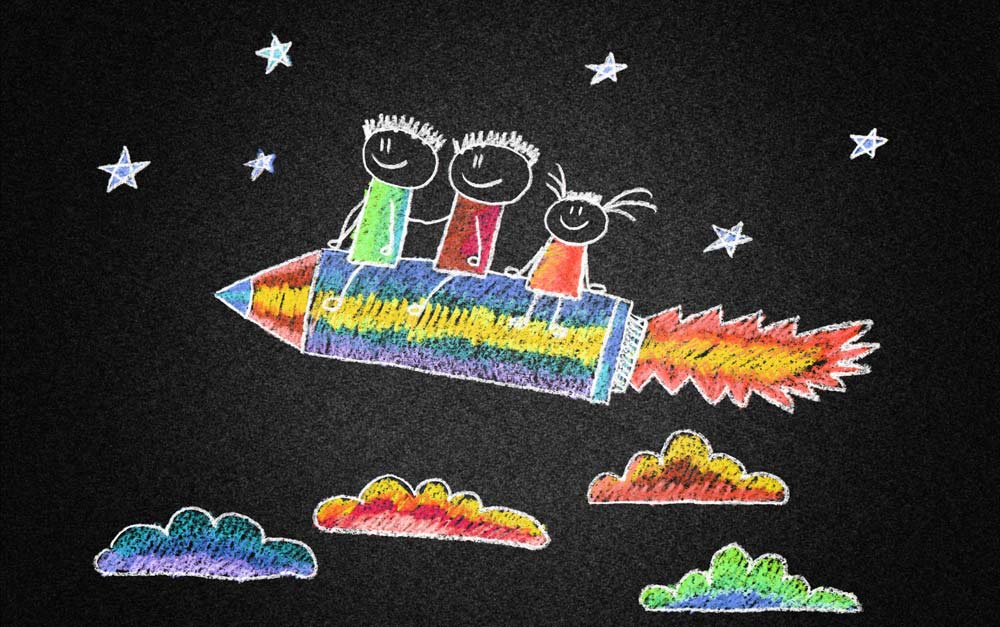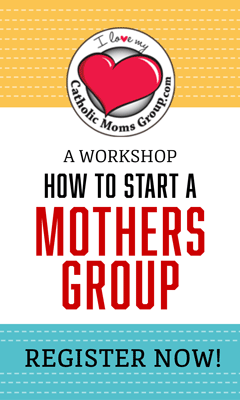
One of the best ways to keep your family close as it grows and adds members, either by birth, adoption, or later on with your child’s own marriage and children, is to integrate storytelling into the rhythm of your family life.
Storytelling need not be elaborately organized, and you don’t have to have an English literature or speech major to do it well. Simply sharing anecdotes about your early life, your family’s past and history and inviting loving relatives to do the same is all it takes to forge bonds, build closeness and give your child a sense of belonging.
When you snuggle up on the sofa with your child and open an old photo album you are showing more to him than just a glimpse of the past. You are showing him a peek into his ancestry, his history, and giving him a sense of his special place in this world.
Sitting at a dinner table with Grandma and Grandpa and listening to Grandpa give an account of his life as a young man provides a unique treasure to the listening child, who can learn from his elder’s experience many of life’s lessons- the value of perseverance through a struggle endured or the makeup of true enduring love. Children may find themselves curious about their relatives’ pasts when those relatives take the time to share the stories of their lives. How did Grandma and Grandpa fall in love? What hopes and dreams did they have when they were young? Listening to stories from relatives can expand a child’s horizons and help him understand things about his kinfolk and his heritage. Grandpa is no longer seen as merely the sage older guy in the family, but a living, growing, interesting fellow on a journey through life, just like the child himself.
Telling family stories also helps a child learn about the world and history in a general way. What was it like living on a farm? Did Uncle Mac really have to borrow a tie and a too-big suit for his First Holy Communion? You mean back then people didn’t usually have a selection of dress clothes? Great Aunt Marge liked to drink tea and sit on her porch visiting with her sister every single night after dinner? What do you mean when Mom was six she had to fold diapers? How do you fold diapers? That’s really how moms kept babies dry before Pampers? And so on…
Storytelling also benefits older members of the family. Sharing stories bonds the older person with the younger one. The elder can pass on his knowledge and wisdom, as well as factual tidbits of life that otherwise may be lost. The older relative generally has a very interested audience, and he and his perspective are appreciated.
“Family stories work to construct family identity,” states one study, entitled “Family Ties: Communicating Identity Through Jointly Told Family Stories”, which appeared in the professional journal Communication Monographs.
“…Story framing, perspective-taking, statements about selves-in-the-family, and identifying as a ‘storytelling family’ emerged consistently as positive predictors of family satisfaction and functioning.”
That’s good news for just about anyone wanting to delve into one’s shared ancestral past with her children.
Look at this summary of the benefits of family story telling. It:
- Helps create and maintain a child’s sense of identity
- Helps a child connect with the past and/or older family member/s
- Helps a child see himself as a valued member of the family
- Helps a child see himself as the unique person he is
- Gives the child an exclusive reference as to how he fits it- gives him a sense of his place in the world
- When uplifting stories told, gives a child a sense of pride
- Helps a child learn valuable life lessons
- Increases a child’s knowledge of history, both personal and general
- Helps family members make sense of and cope with difficulty
- Helps an older family member feel valued and appreciated
- Helps an older family member feel satisfaction for his life experiences and a sense of purpose in his own life

How to Implement Family Storytelling
So, how should you start to implement family storytelling in your family?
Simply invite family members over for a meal and evening and start asking!
Generally, simply asking a relative to share some story from his past will get him talking, but sometimes we all need a prod. Use these questions, with yourself and your older relatives, to launch into a discussion with your children.
What was going on in the world when you were a teenager? What were the popular clothing styles? Songs? Did you live near other family members? What were YOUR grandparents like?
What did your bedroom look like as a child? Did you have any hobbies?
Who was your best friend?
What was it like on Sunday morning when you went to Mass? Did you all go together? Was it a big church? Small? What do you remember about that experience?
(If you are a convert to the Faith) What made you interested in becoming Catholic? What is the story of your conversion?
Is there a time you were afraid and overcame a fear? What was it?
What’s the scariest thing that happened to you?
Did you ever make something as a child? What was it?
How did you celebrate Easter?
Did you pray together as a family?
How old were you and where were you when you met your husband/wife?
My Own Experience
When my children were very little I often called my mother to share with her some cute thing they did. Her advice seemed silly at the time but now I know is invaluable:
Write it down! She said. And I did. I’m so glad I did because memories do fade and I now have a large box filled with notes, scribbles on napkins and torn off pieces of paper, reminding me of what life was like with five children under seven, and the cute and glorious things they did and said. I can now share those things with them and eventually with their children.
And that’s the other side of the family storytelling. You not only tell about your or the older family member’s experience, but you also share the younger one’s experiences with him and the older members to firmly cement the bond. (Keeping personal, private or potentially embarrassing events quiet, of course, out of respect. This goes both ways.)
Not only is it important to share with your children what life was like in the extended family before them, but they also need to know what life was like when they were alive, but before they could remember. Sharing with them the cute things THEY did and said to you brings you closer and confirms how special they are to you.
My father-in-law was a bombardier in World War II. He hadn’t even finished high school when he enlisted in the army air corps to serve and help protect his country. One story he loved to tell… (By the way, repetition is good. It never hurts to hear a good story over and over. After all, don’t you enjoy classic fairy tales recounted more than just once?) Anyway, one story he loved to tell was about when his plane was shot down and he had to bail out of the aircraft, which was on fire. He parachuted to a little town in Belgium, (luckily for him it was friendly territory), and he was greeted by schoolchildren. He gave to the children all the chocolate that was provided in his flight suit. Soon, curious women came to see the man who fell from the sky. They were enamored with his parachute- made of silk, and which was, coincidentally, the same material they used for stockings. He gave them that and was a little bit of a hero, and a legend.
When my children heard that story for the first time, they no longer saw their grandfather as simply the golf professional and loving patriarch that they knew he was, but also as a hero and a young man of courage, and kindness.
My own father came from very humble beginnings. His mother had only a sixth grade education; his father an eighth. The pinnacle of his father’s success was working his way up to manager of a local A & P grocery store.
When my dad was young he used to hitch hike to the country club outside of town, to caddy, in order to earn some money for the family. He was under twelve. He carried heavy bags. He removed greens pins for putting. He washed clubs and cleaned shoes. On Saturdays after working 18 holes (about four hours on a nice day), he might turn around and do it again, all in the name of bringing home money for the family. Now, hitchhiking is generally not recommended any more and I would never let my children do it but it was a different time and I think it’s great for children to hear this story, even with mama’s protestations that Great-Grandma shouldn’t have let Grandpa hitchhike! That rebel, Great-Grandma!
After hearing the stories of Grandpa working double shifts and even almost being kidnapped (really!) our children have a new found appreciation for the person he is today. That’s why he values hard work and hates lazy attitudes, they surmise. That’s why he made his kids work outside jobs the minute there was one available. His experiences contributed to his personality, and his mental toughness…
We all have stories like these in our families. Find out what they are in yours and share them today with your children. In doing so, you will be passing along a treasure of inestimable value. You will be giving the gift of generations—stories of life and love and learning.
Theresa Thomas
Theresa Thomas is a stay-at-home mother of nine and the wife of David. She writes for Integrated Catholic Life , is a columnist at Today’s Catholic News, and her second book Big Hearted: Inspiring Stories from Everyday Families is available from Scepter Publishers.



